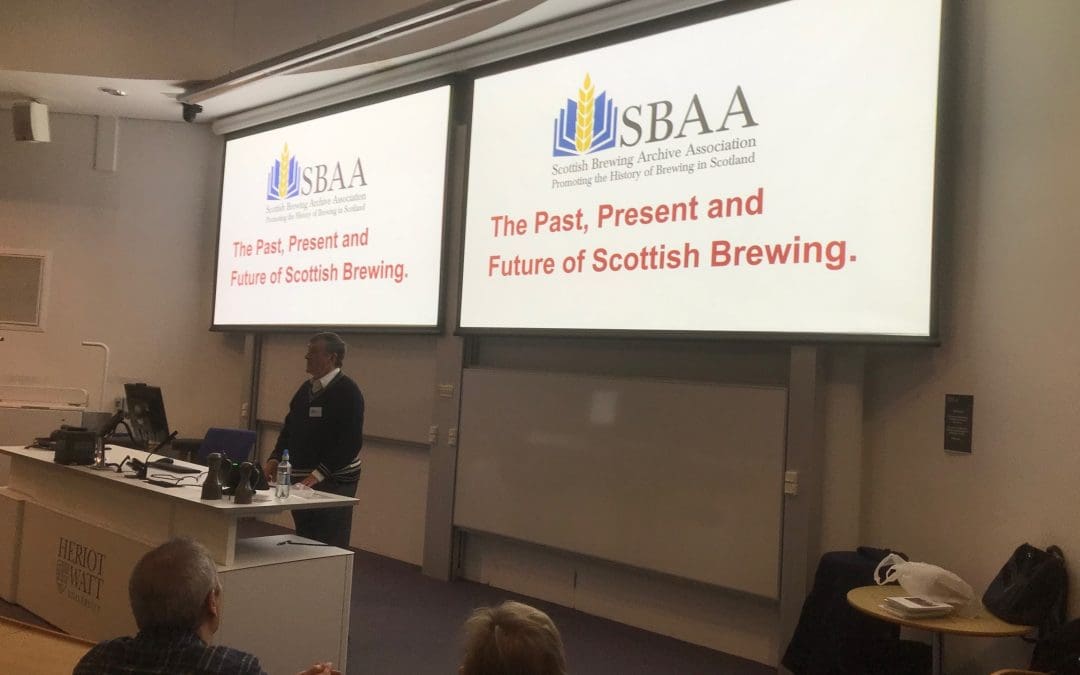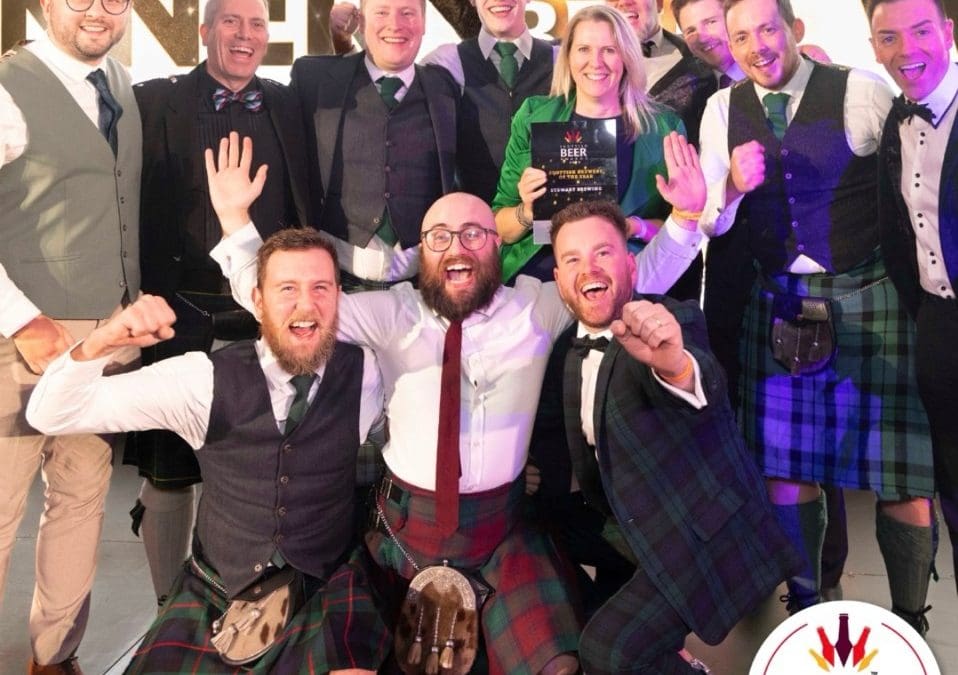1. Chairman’s Statement:
Welcome to the October 2021 Newsletter.
The SBAA are very grateful to our members who have made a valuable contribution in providing information. Please keep this going.
In the last Newsletter the SBAA passed on our congratulations to Sir Geoff Palmer who had been appointed as the new Chancellor of Heriot-Watt University. This time we offer our congratulations again to Sir Geoff on receiving the Pride of Scotland Life Time Achievement Award. In more recent times, Geoff has been a powerful voice for change, prompted by the Black Lives Matter movement. Geoff was also responsible for the formation of the Scottish Brewing Archive and is a life member of the SBAA. Keep it going Geoff.
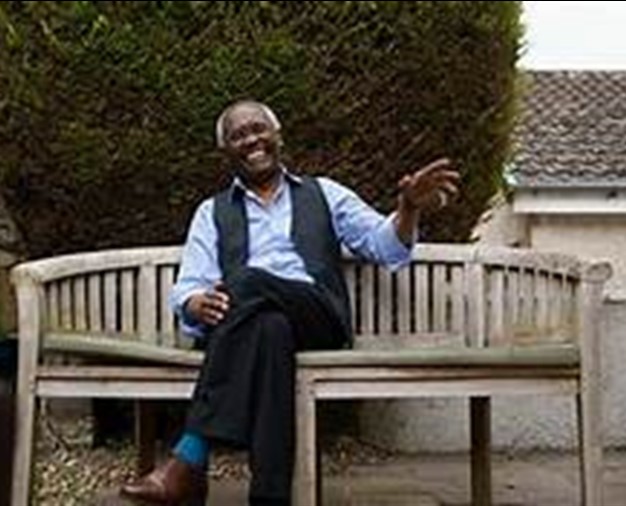
There is a great association of Scottish brewing heritage with Heriot-Watt over the years, long may this continue.
It is with great sadness to hear of the passing of Allan Hardie, a great stalwart in the brewing industry. I did not know Allan myself, but did hear of his exploits when working at Alloa brewery from members who worked beside him. Thanks goes to Michael Clark for informing me and to Brian Eaton for the obituary.
The SBAA held its first event in over 20 months when members met for the Abbeyhill brewery heritage walk in Edinburgh, many thanks to those who attended. Our next event will be our AGM held in November and you will receive details of this later.
October marks the beginning of a new financial year and as a result this is a reminder to renew your membership before the end of October.
Take care.
John Martin
2. Heriot Watt 200 Years

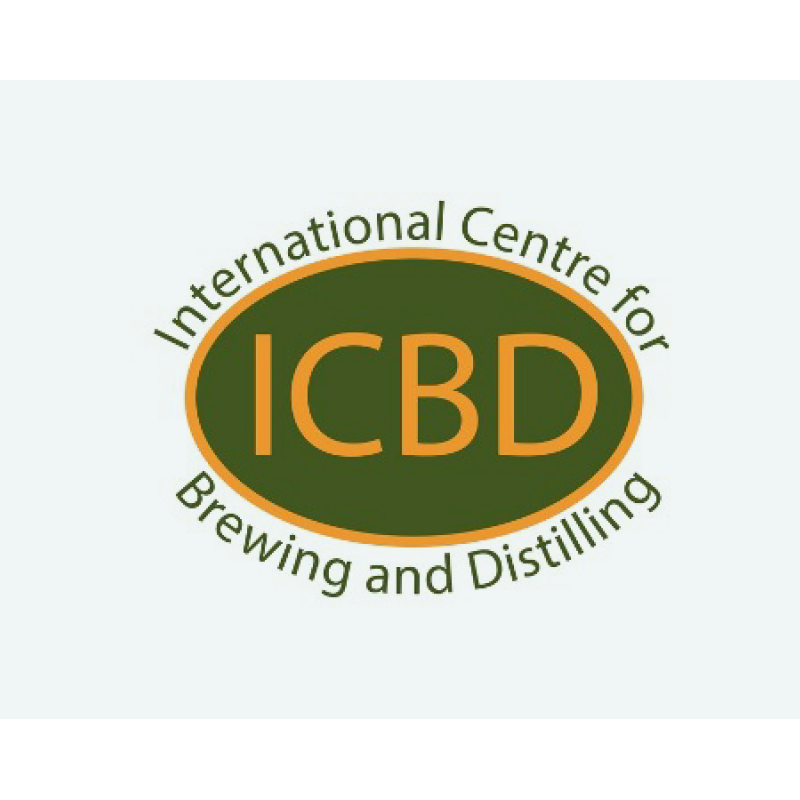
Heriot-Watt University celebrates its 200th anniversary when it created the world’s first mechanics institute in Edinburgh in 1821. Heriot-Watt University is a pioneer in educating men and women from different backgrounds to achieve their potential. It continues to be a pioneer in education with a focus very much on the future, and none more so than brewing and distilling.
The International Centre for Brewing and Distilling (ICBD) is a unique teaching and research facility. The centre is based on a partnership between industry and academics and based in the Riccarton campus in Edinburgh.
The following are just a few snippets of information connecting brewing heritage and Heriot-Watt University.
- Emil Westergaard was born in Copenhagen in 1873 and graduated in Pharmacy and was the very first Professor of Brewing at the Heriot-Watt College. Westergaard came to Scotland in 1898 and established his own laboratory in Edinburgh and did work for the William McEwan brewery to carry out research on micro-organism, bacteria and yeast culture. To begin with he gave a number of summer course lectures on brewing at Heriot-Watt in 1903, before being appointed as Professor of Brewing in 1912.
- William McEwan started his own brewery at Fountainbridge in Edinburgh in 1856 and was very successful within a few years, in not only the home market but also when exporting. McEwan was not only a successful brewer, but also became a politician and a philanthropist. His most famous gift was the funding of the McEwan Hall for Edinburgh University. McEwan’s financial generosity was also enjoyed by the students of Heriot-Watt College, when he set up a financial aid scheme.
- Sir Geoff Palmer was the first black professor in Scotland at Heriot-Watt University and discovered the barley abrasion process adopted by the UK largest breweries. Sir Geoff’ Palmer PhD research was supported financially by the Heriot-Watt award scheme.
Sir Geoff has received many accolades over the years and too many to mention in this short article.
Sir Geoff was appointed the Chancellor of Heriot-Watt University this year, a fitting appointment during its 200th anniversary year.
3. James Allan Hardie Obituary (1942-2021)
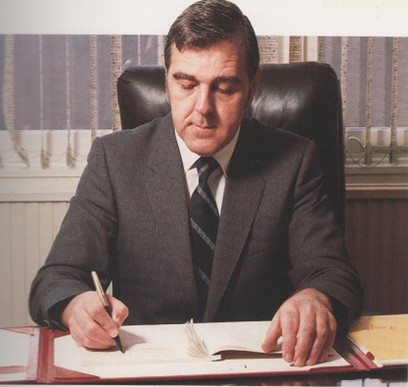
Allan on finishing school decided on a brewing career; which was not surprising given that Alloa at that time was the brewing capital of Scotland with 6 or more operating breweries.
Allan and John were sent to study brewing for three years at Heriot-Watt University.
On graduation, Allan went to Burton, brewing on shift, but soon seconded to Grenada Brewery in August 1969 returning to Burton in January 1971.
Allan was soon to return to Scotland, taking up the role of Head Brewer at the Alloa Brewery under Cecil Mutch. The Alloa Brewery had grown substantially with a full rebuild in the 1950s and then expansion with the defensive merger of Ind Coope, Tetley’s and Ansell’s to form Allied Breweries in 1962.
Allan took over from Cecil as Production Director and joined the Board where he had great influence and was a steadying and analytical counter to some of the blue-sky ideas coming from our much- loved Managing Director John Mackenzie.
Nevertheless, we did finish up running boats on Loch Lomond and operating a bear park at Balloch!
Alloa Brewery was able to achieve a degree of independence within Allied Breweries: most probably due to the geographical separation but also because the Scottish beer market was predominantly free trade compared with the large, tied estates in the rest of the UK.
This however was a problem for Alloa. The Scottish market was dominated by two brewers, Scottish and Newcastle and Tennent’s, who between them had over 80% of the market, leaving the few smaller breweries, Alloa, Lorimers, Drybrough’s and Belhaven to fight over the remaining 20%.
Allan and the Board recognised that survival depended on successful mergers of the smaller breweries so that they could compete.
Vaux of Sunderland owned the Thomas Usher and the Lorimer and Clark Breweries in Edinburgh; the latter sending almost all its production South in tankers to Sunderland to be packaged as Scotch Ale. In 1980, Vaux decided to sell their Ushers Brewery (by then trading as Lorimers) to Alloa Brewery along with their 213 tied houses.
Lorimer and Clark Brewery was not part of this deal, but Vaux decided to stop the transfer of Scotch to Sunderland leaving this Brewery with virtually no production. The Brewery was sold, but the lack of a supply contract was a major problem for the new owners.
Allan Hardie was instrumental in opening up a number of Alloa’s prestige cask ale pubs in Edinburgh to stock the L&C beer. This gracious move allowed the new owners to get up and going and to develop their trade as the Caledonian Brewery; without his help they might not have survived.
In 1987, Allan and the Alloa team met with Watney, Mann and Truman, the owners of Drybrough’s Brewery in Craigmillar, Edinburgh to work out a merger deal. It was unclear at first who was selling what to whom, but soon became evident that Alloa Brewery wanted to stay in Scotland, but Grand Met did not, so the deal to purchase Drybrough’s, along with its 187 tied pubs, was done.
Having been the major exporting brewery for both Ind Coope and Allsopps and then for Allied Breweries, Alloa Brewery had the capacity to absorb the production of both Lorimer’s and Drybrough’s, so regrettably they were both closed. Allan had been instrumental in overseeing the smooth implementation of the whole process.
Alloa Brewery now had the largest (and best!) tied estate in Scotland with 450 tied pubs and restaurants with top venues such as The Buttery, Rogano, The Granary, Hawes Inn and the Rose Street Brewery plus 2,500+ free trade accounts – able now to compete with the two big boys.
Long might that have continued but for the Government interference in the free market with The Beer Orders in 1989, which broke the link between the brewer and his tied estate to the effect that Allied sold off all its 4,500 pubs, becoming a “wholesale” beer supplier.
Not surprising therefore that in 1991, Allied Domecq, as now called, decided that brewing was non-core and wanted to sell off its breweries 50:50 to two buyers – Carlsberg and Bass.
This was blocked by the Monopolies and Mergers Commission with the default position that Carlsberg acquired 100% and took control of Allied’s 6 breweries. – Alloa, Wrexham, Burton, Leeds Romford and Warrington – to form Carlsberg-Tetley, joining their sole brewery at Northampton.
A progressive closure of these breweries was started with Burton sold to Bass and the Alloa Brewery closed, after 188 years of continuous brewing, with a last mash on 29th April 1998. I must have brought a tear to Allan’s eyes to see the brewery which he had overseen for so many years be thrown aside.
However, Allan’s career did not end with the brewery closure. He was offered the role of Sales, Marketing and Distribution Director to continue Carlsberg-Tetley’s operations in Scotland and then as Chairman until his retirement.
It would be true to say that Allan’s work was his life and he had dedicated it to brewing and, in particular, to the Alloa Brewery so he took retirement very hard. His health deteriorated and he suffered much ill health in the last few years until his death on 25th August 2021.
In his private life Allan was a great supporter of Clackmannanshire County Cricket Club being its President for many years and starting the practice of bringing in a professional coach, usually from overseas, to help the players over the summer months.
Allan was also a SBAA member up until his ill health.
His wife, Margaret their daughter Rosalind and son in law Jason will miss him dearly.
Brian Eaton & John Bain
August 2021
4. First SBAA Event following Lockdown
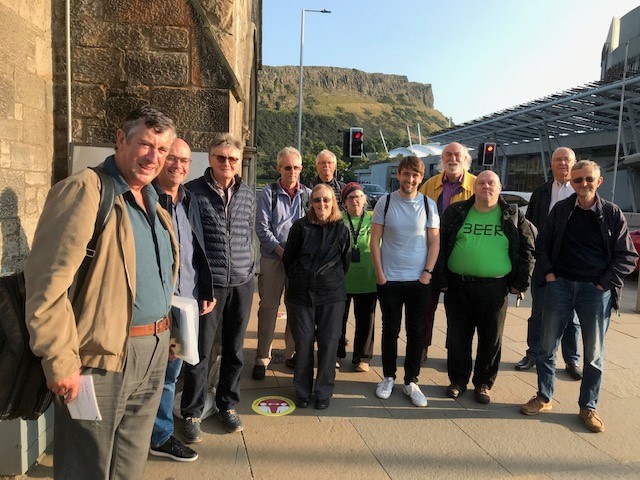
We were blessed with a warm evening for our first event since the Covid 19 crisis. Fifteen SBAA members took part in a historical brewery walk covering the ABBEYHILL area of Edinburgh. John Martin , our guide for the evening , came well prepared with a good selection of laminated photos that brought life back to the locations we visited on the walk.
Brewing related locations visited on the walk are shown on this map dating from 1908
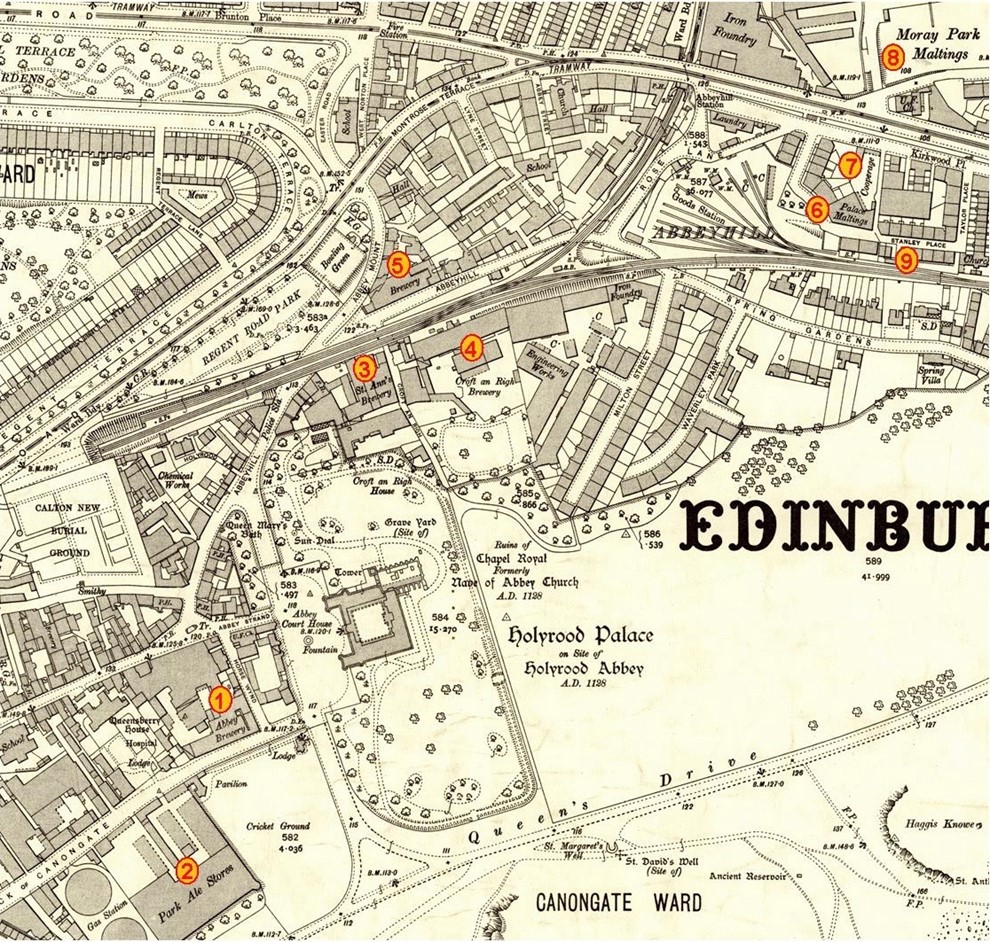
The evening concluded at BELLFIELD BREWERY , where we were joined by Les Hutcheon and George Douglas. Some excellent beers and pizza were shares along with some good conversation.
5. Jex-Blake Mosaic IPA
Towards the end of the Abbeyhill brewery heritage walk, held in early September, Jim Darroch pointed out the street Jex Blake Drive and very close to Bellfield Brewery and named after one of their beers, Jex-Blake Mosaic IPA.
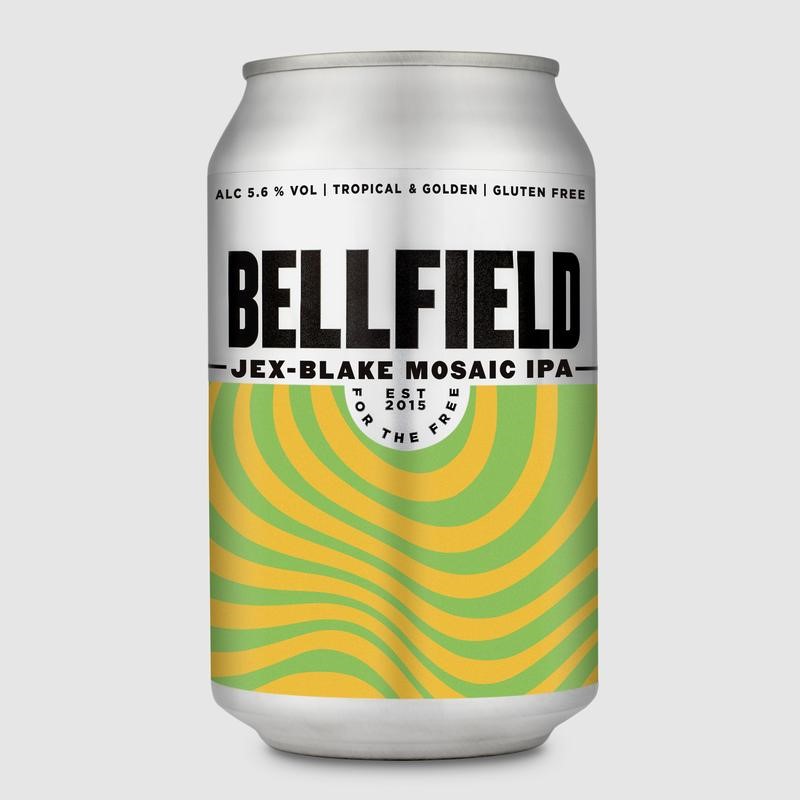
However, it was only afterwards when enjoying our refreshments that Jim further explained that the beer was named after Sophie Jex-Blake. In 1869 Sophia and six other women, collectively known as the Edinburgh Seven were admitted to study medicine at the University of Edinburgh. However, the University later overturned its decision. Jex-Blake’s ongoing struggle divided the faculty, attracting international attention with support and opposition in equal measures. Her long campaign to secure women access to the medical profession was ultimately successful. In 1889, an Act of Parliament sanctioned medical degrees for women.
Jex-Blake went on to become the first female doctor in Scotland and one of the first in the UK.
She subsequently founded two medical schools for women: one in London and one in Edinburgh, where she started a women’s hospital.
This information can be found in the Bellfield Brewery web site and will be added to future Abbeyhill heritage walking tours.
John Martin
6. Robert Younger Stoneware Bottle
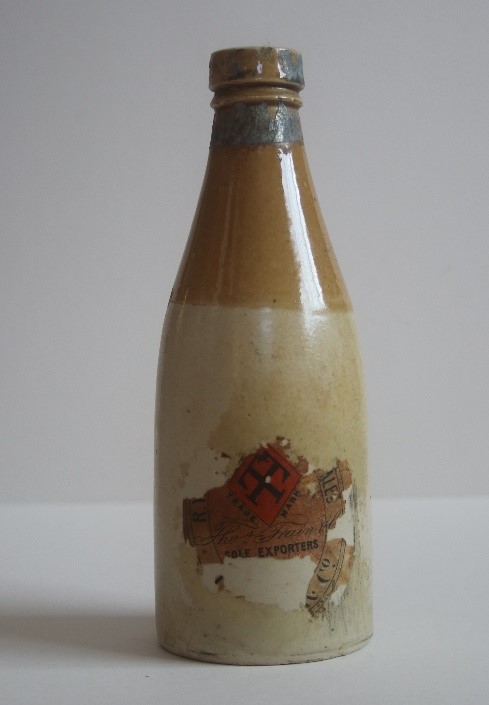
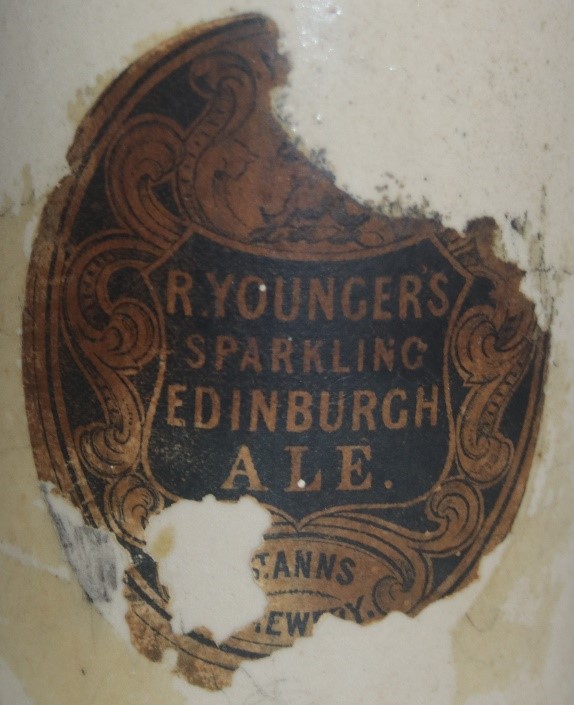
I joined the SBAA recently. I’ve been interested collecting and researching Scottish pottery for many years and am a member of the Scottish Pottery Society. For some time now I have looking into the use of Scottish stoneware bottles to export beer and ale etc overseas. Exporters had a choice of glass or stoneware bottles but it appears that it is only the use of the former that has received any attention at all. Stoneware bottle production was centred around Glasgow and Portobello. Many will be familiar with stoneware ginger beer bottles bearing stamped labels fired beneath the glaze, the more attractive examples of which are eagerly collected, some examples changing hands for several thousand pounds. The majority were produced for the home market but there was a good trade with Canada, Australia, New Zealand and South Africa for such bottles, although there was competition from a number of English potteries.
The vast majority of the stamped ginger beer bottles shipped overseas were delivered to the brewers empty for them to fill, but these were vastly outnumbered by the stoneware bottles shipped overseas filled with ale etc. These bore paper labels which usually had a fairly short life span, the majority ending up disposed of in tips, privies and the like. Once the labels disintegrated such bottles became totally anonymous so hold no interest for British and other collectors. Quite apart from that export bottles, by definition, rarely turn up in the UK.
Having said all that there are rare circumstances where export bottles, still bearing remnants of their original labels, have survived overseas hidden in family attics and cellars and very occasionally these come to light. Over the past twenty years or so I have been fortunate enough to acquire a number of these. As the Scottish potteries tended to impress their names on bottles it’s possible to start to build up a useful picture of who was supplying bottles to which brewer and when. The picture emerging is far from definitive and often produces more questions than answers, but it’s a start. The surviving labelled bottles are, frankly, not usually particularly attractive as collectables or display items and often quite tatty.
On joining the SBAA I was asked by John Martin to let him know my areas of interest and the reason for joining. Given my interest was largely confined to the above I provided quite a bit of detail and thought it useful to attach a couple of images of such a bottle. I chose one at random, a bottle used by Robert Younger of St Ann’s Brewery as in the attached image. This was a fortuitous choice because it turned out that John is currently researching Robert Younger and St Ann’s Brewery on behalf of the Younger family. My example was the first stoneware bottle he had seen that still had a paper label on it.
As far as I can tell this example is a pretty rare survivor. Of particular interest is the label remnant on the rear in the name of Thomas Train, Robert Younger’s exporting agent. Toward the base of the bottle is the impressed pottery mark of Grosvenor’s Eagle Pottery based in Bridgeton, Glasgow. That helps a little in dating the bottle because the pottery opened in 1869. The problem is trying to fix a closing date. At the moment I’m guessing about 1875 -1880. That’s why I have suddenly taken a great interest in labels. I’m hoping someone out there is going to provide the answer.
Denis Ayers
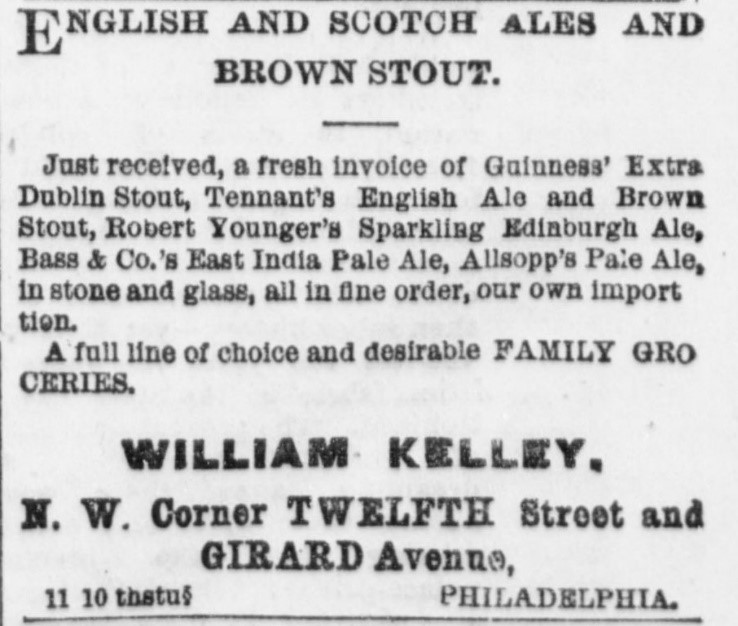
The Daily Evening Telegraph, Philadelphia, Tuesday 2 May 1871

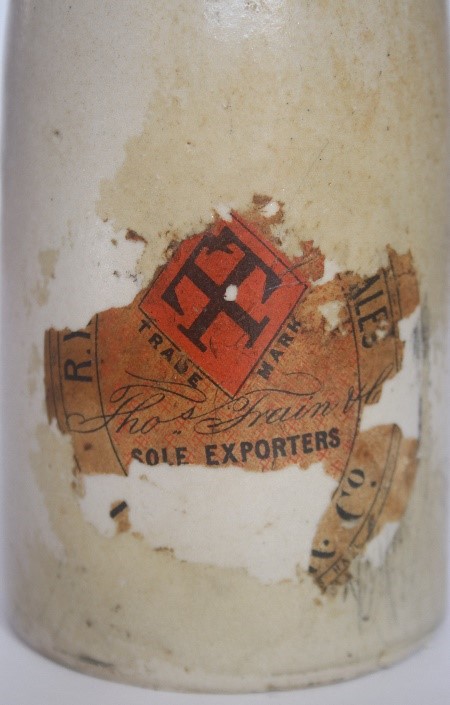
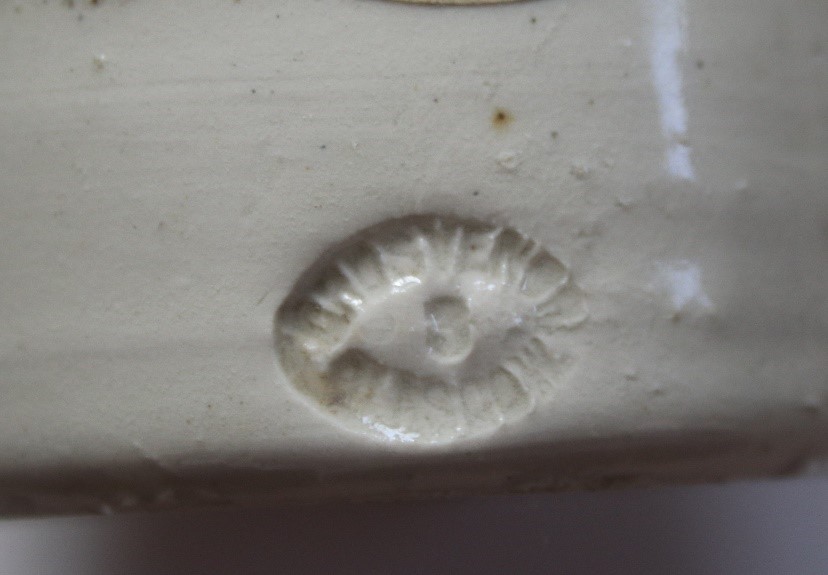
7. Name the Brewery?
The last teaser in the July Newsletter , right , was provided by Michael Clark. The brewery is the George Youngers of Alloa Meadow Brewery.
Brewing ceased in 1877 and the building became the brewery offices.
The buildings still exist. In this photo
transport manager Jim Christie Snr. proudly shows off the new fleet of “travellers” Ford Anglia 105E’s.
Supplied by Millar’s of Stirling c.1960.
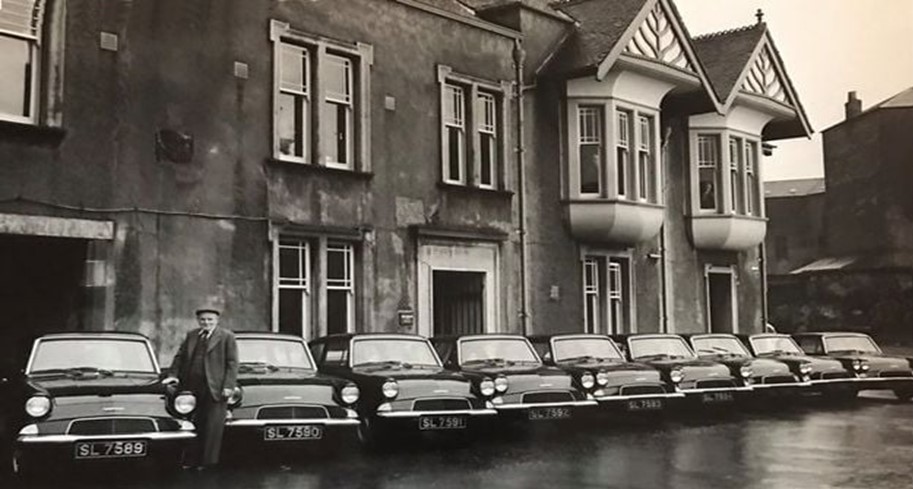
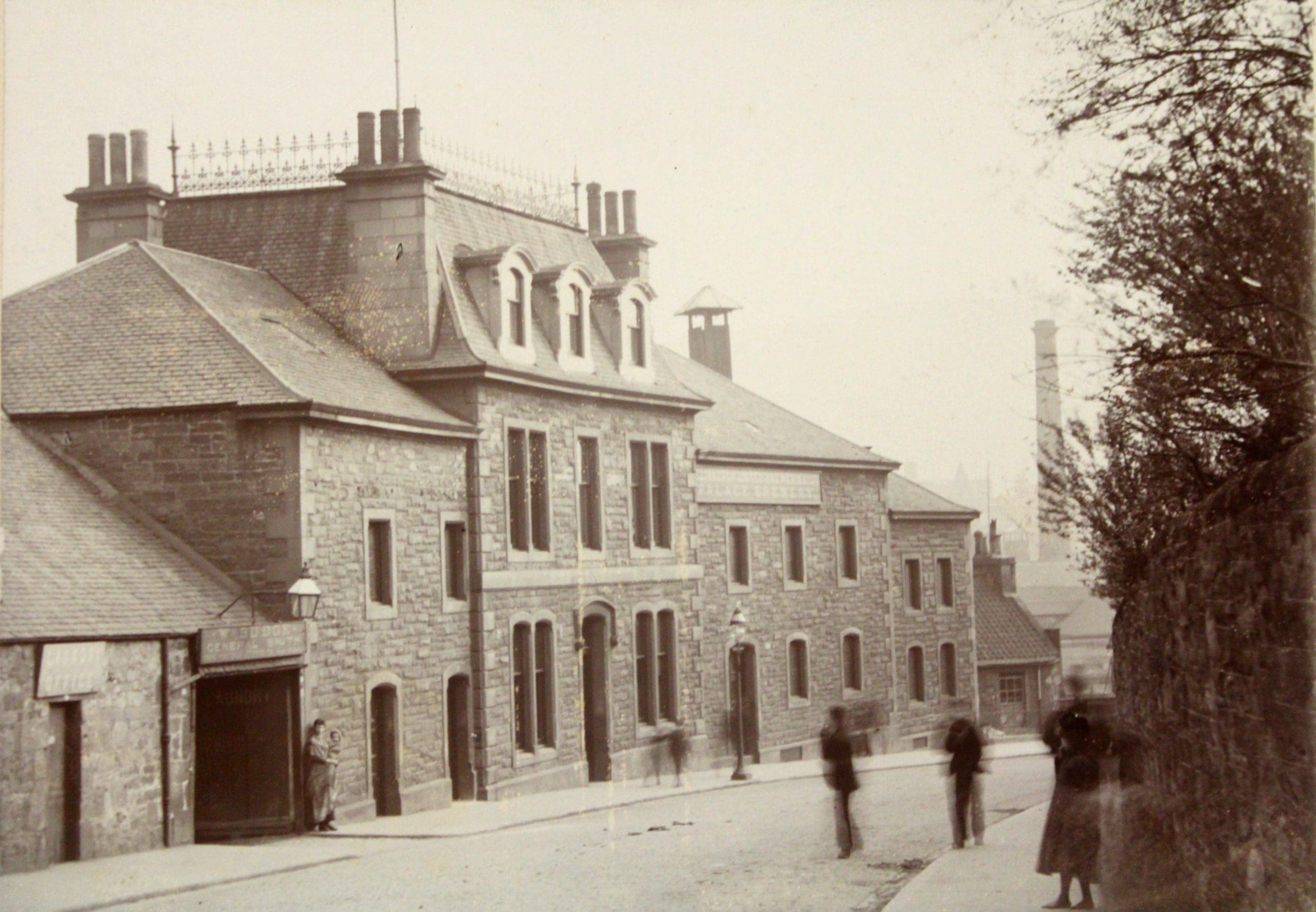
Tough one this time round. Clue , It helps if you were at the last SBAA event.
If you have any old photos in your personal collection, please send them in, particularly if they haven’t been seen before by a wider audience , the SBAA is your showcase.
8. NAT 20 Brew
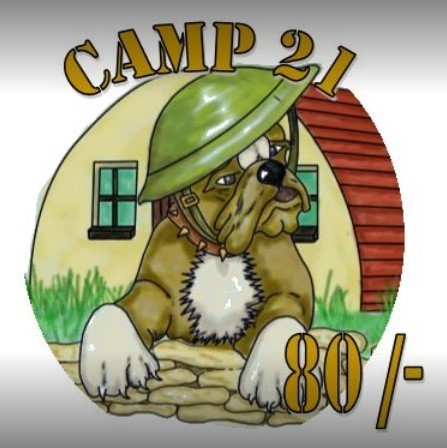
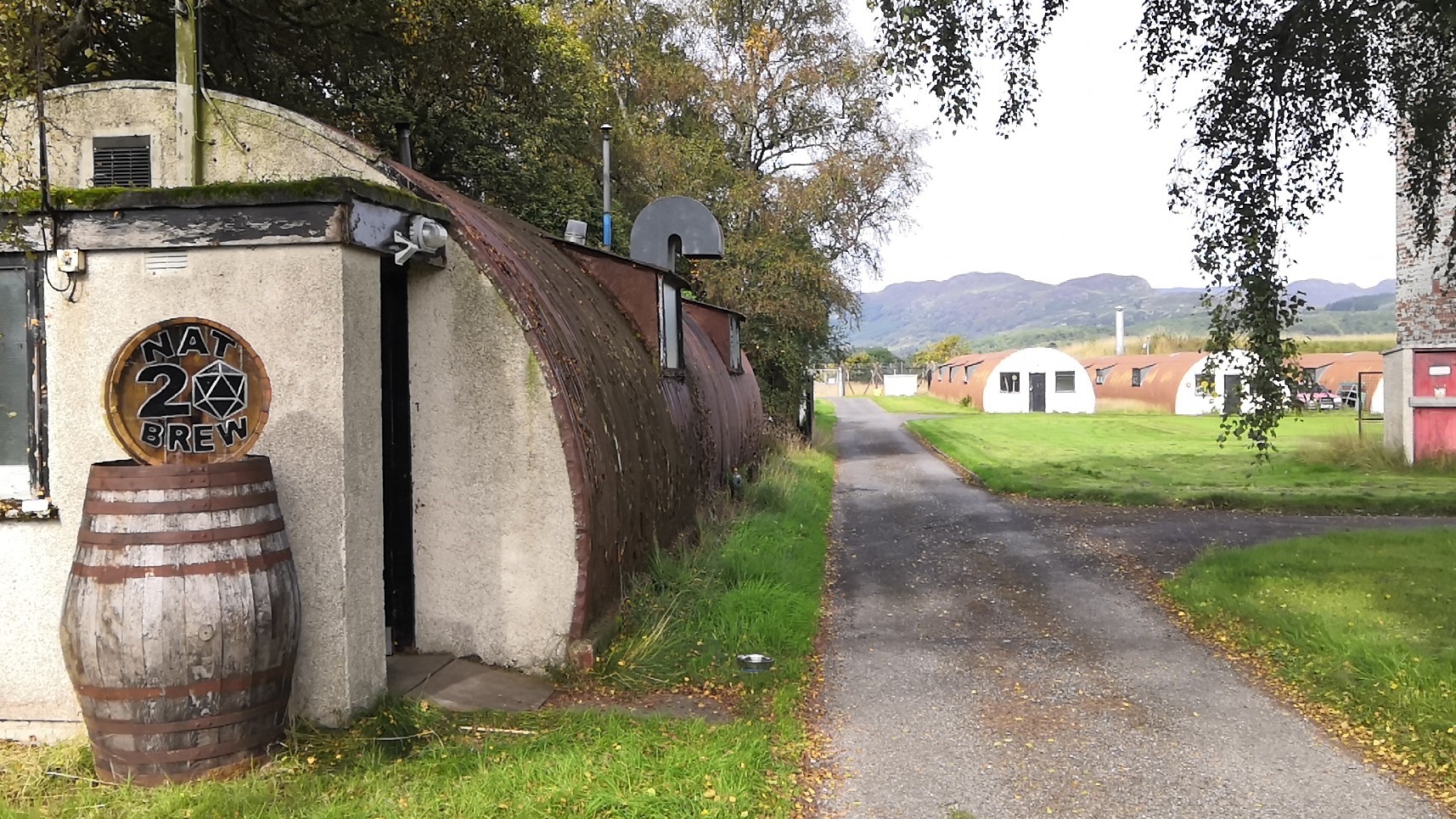
Possibly one of the newest , smallest and certainly unique breweries in Scotland.
Operating from within a former WW2 prisoner of war camp, hut 53 is located in Comrie Perthshire. “Nat 20 Brew” is off grid and is self-sufficient for its own power. The really interesting aspect is that all their recipes are either very old family or historic. Beers are bottle conditioned.
Thanks to SBAA member Jim Darroch who stumbled across the brewery when walking in the area. For more information google Nat 20 Brew.
9. Last Runnings
![]() AGM – The ANNUAL GENERAL MEETING will be held on Thursday 18th November 7pm in the upstairs lounge at the Beehive. The Grassmarket , Edinburgh.
AGM – The ANNUAL GENERAL MEETING will be held on Thursday 18th November 7pm in the upstairs lounge at the Beehive. The Grassmarket , Edinburgh.![]() JOURNAL – The annual SBAA journal, with some really interesting articles, should be ready to be posted to all members before December – remember you MUST have paid your fees by the end of October to receive a copy.
JOURNAL – The annual SBAA journal, with some really interesting articles, should be ready to be posted to all members before December – remember you MUST have paid your fees by the end of October to receive a copy.
![]() ANNUAL SUBSCRIPTIONS ARE NOW DUE – Our treasurer e-mailed all members on the 16th of September detailing payment options – If you haven’t, please renew NOW. If you are not renewing, please inform the treasurer at treasurer@scottishbrewingarchive.co.uk
ANNUAL SUBSCRIPTIONS ARE NOW DUE – Our treasurer e-mailed all members on the 16th of September detailing payment options – If you haven’t, please renew NOW. If you are not renewing, please inform the treasurer at treasurer@scottishbrewingarchive.co.uk![]() A warm welcome to new member Denis Ayers from Inverness
A warm welcome to new member Denis Ayers from Inverness
Correspondence to the SBAA Secretary ivor.reid@sky.com
